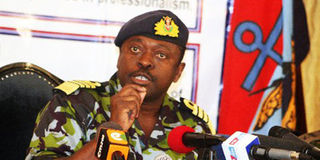Media coverage of war deaths and why military should not overstretch its luck

Kenya's Chief of Defence Forces Samson Mwathethe addresses a press conference at the Department of Defence (DOD) in Nairobi on January 21, 2016. In all wars, the military like to withhold information about their operations, unless it serves their war games. PHOTO | ROBERT NGUGI | NATION MEDIA GROUP
What you need to know:
- The way the media covers a war has great impact on public perceptions as well as the way an army responds to public demand for news and information about their operations.
- In general, armies are only keen on reporting the numbers of the enemy dead, while minimising their own.
With tears spilling from her bloodshot eyes and rolling down her chubby cheeks, Jacinta Kajuju was one of the devastated army wives interviewed by NTV on Tuesday night.
“If my husband has perished in Somalia, then let’s remove our men from Somalia,” she said, as if everybody understood the logic.
Another army wife, Rose Omuchere, said she switches off her television at news time because her children would ask awkward questions about the whereabouts of their father, which she could not answer.
Both women were showing their frustrations in getting information about the fate of their soldier husbands following the Al-Shabaab attack on the KDF camp on January 15 in El-Adde, Somalia.
They were also exhibiting their knowledge and awareness of why we are in Somalia.
The way the media covers a war has great impact on public perceptions as well as the way an army responds to public demand for news and information about their operations.
Indeed, in all countries, the media and the military have a symbiotic relationship.
The military needs the media to build public opinion in support of it operations, and the media needs the military to get the news that the public want.
But the relationship gets complicated because the dissemination of news and information is part of modern warfare.
All armies try to control what the media, and by extension, the public, gets to know about their operations.
ARMY'S RELUCTANCE
In all wars, the military like to withhold information about their operations, unless it serves their war games.
This is informed by the knowledge that the media serve not just as providers of news and information but can also be conduits for disinformation, misinformation and propaganda.
And reporting war deaths has always been number one in the equation.
In the 1960s, the Americans went thousands of miles from home to fight in Vietnam in the name of defending their freedom.
But when more than 25,000 American soldiers perished in the far-flung war, the American media began reporting the war in terms of human cost and the deep personal grief and shock that affected families and communities.
The Americans also pulled out of Somalia after the image of an American soldier’s body being dragged through the dusty streets of Mogadishu by anti-American protesters was published in 1993.
In general, armies are only keen on reporting the numbers of the enemy dead, while minimising their own.
This sensitivity about war deaths explains why the State has also been quick to clamp down on those distributing in social media, pictures of dead KDF soldiers.
The military is keenly aware that media coverage creates public support or non-support for its operations.
It’s also aware that troop morale and that of their families may be dependent on what information is reported.
INFORMATION CONTROL
Recognising the power of the media, Napoléon, one of the greatest commanders in history, said rather dramatically: “Four hostile newspapers are more to be feared than a thousand bayonets.”
The KDF has so far been lucky. It has had no newspapers to fear. It has commanded how the media has been reporting Operation Linda Nchi.
The media, including NMG, has reported the KDF exploits in Somalia while embedded with KDF.
The only time when KDF seemed to lose control is when the UN and some co-opted local journalists were able to file independent reports about KDF’s alleged involvement in charcoal and sugar trade in Kismayu.
The other time was during the attack on Westgate in Nairobi by Al-Shabaab when the media was also able to report independently of KDF.
The media reported KDF soldiers were involved in looting although the evidence provided was tenuous.
But inside Somalia, KDF has been in control of what information gets out, including how they polish their boot to keep off snakes and scorpions.
But KDF should not stretch its luck too far.
There is now a need, following the El-Adde debacle, for the military to understand the need for coming out clean about the deaths in the camp.





